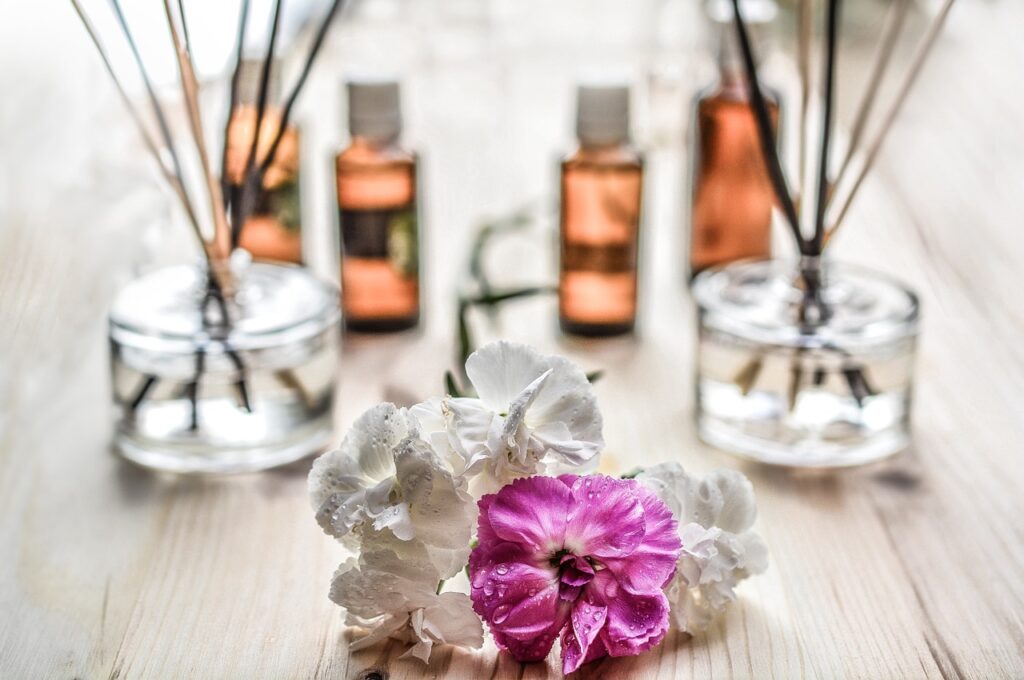
A Natural Holistic Therapy

Aromatherapy is a holistic therapy which uses the natural oils extracted from plants (flowers, bark, stems, leaves, roots or other parts of a plant) to enhance psychological and physical wellbeing. The inhaled aroma from these ΄essential΄ oils stimulate brain function. Essential oils are also absorbed through the skin, where they travel through the bloodstream and can promote whole body healing.
Aromatherapy is one of the most popular complementary therapies and is usually used to relieve a variety of conditions, including pain relief, mood enhancement and increased cognitive function. It is especially beneficial for relieving stress-related symptoms such as headaches, insomnia and anxiety.
There are a wide number of essential oils available, each with its own healing properties.
How does it work?
Aromatherapy is most commonly used though the sense of smell where it is believed to stimulate the brain, but it can also be absorbed through the skin, usually via an aromatherapy massage.
Inhalation
Aromatherapy is most commonly used by inhalation, or by smelling the essential oils. Our sense of smell is directly linked to the brain, which is why we react in different ways to different scents. When the brain receives a smell, it sets off a reaction in the body, such as feeling hungry, energised or relaxed. The nerves in our nose can also recognise smells and it links them with a memory, which is why certain scents can make you feel happy or sad.
Aromatherapy Massage
During a massage, the essential oils are added to a carrier oil to dilute the mixture and are then massaged into the skin. The oils which are used will be tailored to suit the specific requirements. Aromatherapy massages are incredibly relaxing, bringing together the powerful benefits of both aromatherapy and massage. The psychological benefits of an aromatherapy massage include, mood improvement (as physical touch causes the release of our happy hormones), promotes relaxation (by reducing stress and improving your sense of well-being) and reduction of nervous tension.
The physical benefits of an aromatherapy massage include, improved circulation (which promotes healing), increased lymphatic drainage (which helps reduce fluid and toxin build-up), and reduces muscle tension (which induces relaxation).
Benefits of Aromatherapy
Aromatherapy helps to relieve the symptoms associated with several conditions, such as:
- improves sleep quality
- reduces stress, agitation, and anxiety
- in the management of chronic pain
- soothes sore joints
- treats headaches
- improves digestion
- alleviates side effects of chemotherapy
- in the short term it may reduce pain and anxiety for those with cancer. In fact, many people with cancer turn to aromatherapy as it makes them feel happier and improves their ability to cope with the changes happening.
What to Expect From an Aromatherapist
During an initial consultation, the aromatherapist will ask about your lifestyle, general health and wellbeing and what you would like aromatherapy to help you with. They will also discuss your medical history to gain a full picture of your health before starting. Once the reasons and desired outcomes have been discussed the aromatherapist will suggest a treatment plan.
The personalised treatment plan usually involves at home treatments and aromatherapy massage sessions. On average, a full series of treatments may include up to 10 sessions, though only one may be required. Each individual is different and the duration of the course of treatment will depend on the individual circumstances.
If you are suffering from an illness, you should consult your doctor before any sessions. This is because aromatherapy is a complementary therapy which is designed to complement any other treatments you may be receiving.
The aromatherapist will discuss the available oils and their properties. The most appropriate essential oils for managing your symptoms will be used.
Is Aromatherapy Safe?
Provided they are used correctly, essential oils are safe to use. The oils should never be swallowed or massaged into broken skin. You must inform your aromatherapist if you suffer from any allergies, or are prone to skin sensitivity, so they can take necessary precautions.
Elderly people, children and pregnant women should seek medical advice before trying aromatherapy. In some cases the oils may interfere with prescribed medication. You should therefore tell your aromatherapist of any medications you are taking during the initial consultation.
What Qualifications and Experience Should an Aromatherapist Have?
Aromatherapists should have a high standard of training in anatomy and physiology, as well as in the use of essential oils. Many will also be trained in aromatherapy massage.
There are several professional regulatory bodies that regulate the aromatherapy industry. If a therapist joins one of these bodies, they will require specific qualifications and training. In addition, many professional bodies will ensure their members undergo continued professional development in order to continuously develop their skills. The regulatory bodies for each country can easily be found online.
Using Aromatherapy at Home
The following are some ways that aromatherapy can be easily used at home:
1. Bath water
Many people find that they have a more relaxing soak when they add essential oils to their warm bath. Your aromatherapist can advise which oils will best suit your needs and whether or not they need diluting.
2. Steamed
This is especially helpful if you’re feeling congested. Simply add a few drops of your chosen essential oil to a bowl filled with hot water and inhale the steam.
3. Burned
Burning essential oils in an oil burner is very popular. The oil is placed on a shallow surface above a candle. The heat of the candle slowly burns the oil, encouraging the scent to fill the room.
4. Inhaled
A great way to get a quick boost from your chosen essential oil is to have a small vile at your desk. This way you can directly inhale your oils and reap the benefits anytime!
You should consult your doctor first if you have asthma or suffer from other respiratory conditions.
5. Sprayed onto fabric
An easy way to bring aromatherapy into your home is to add some essential oils to a room spray. You can spray them on furniture, bed linen or pillows to add a relaxing, comforting scent. To ensure the mixture does not stain or damage the fabrics, you should first ask an aromatherapist.
The equipment which can be used at home includes diffusers, aromatic spritzers, inhalers, bathing salts, body oils, creams, or lotions for massage or topical application, facial steamers, hot and cold compresses and clay masks
Most Commonly Used Essential Oils
There are hundreds of different aromatherapy oils, all of which have different benefits. An aromatherapist can recommend a single oil, but is more likely to recommend a combination.
Some of the most common essential oils include:
- Ginger – Ginger can help relieve digestive problems. The scent is known for revitalising the body.
- Lavender – The ultimate relaxer, lavender is recommended for those who find it difficult to sleep.
- Clary sage – This oil is relieves menstrual cramps and manages labour pains. It is also known for its stress relieving properties.
- Eucalyptus – This oil is known for relieving respiratory congestion, so it can be helpful if you are suffering from a cold.
- Peppermint – Mint is an energising oil which may help ease migraines, relieve nausea and abdominal cramps (anti-spasmodic).
- Lemon – Lemon has an uplifting and detoxifying scent which helps energise you and lift your mood.
- Fennel – Fennel helps the digestive system and encourages menstrual regulation.
- Mandarin – This is a calming oil which has a warming citrus scent. It is often combined with lavender oil to help children relax.
Summary
In conclusion, aromatherapy has been shown to be very effective for treatments of the body and mind. It has been practiced from ancient times to cure various ailments and is still, to this day, very popular for treating these same ailments, as well as treating newer ailments of our times, such as stress and anxiety.
